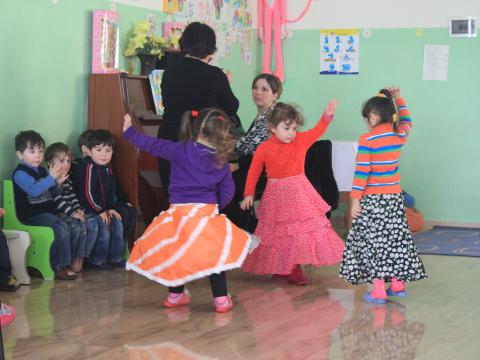Five years Later, Former Child Friendly Space Continues to Give Joy to Children

A few kilometers outside Gori and off the main highway lies Sakasheti, a small village that is home to roughly 100 families. The village does not look like it did five years ago, after the 2008 Georgian-Russian war, when the village was emptied and some of the houses destroyed. The village is once again inhabited; community members are back to their homes and fully engaged in their everyday routines.
One positive thing that remained as a result of the conflict is Sakasheti Kindergarten which operates in a building constructed by World Vision as a Child Friendly Space. During the conflict and immediately after, it served to improve the psychosocial wellbeing of children affected by the emergency and conflict.
In the village, where even in Soviet time there was no kindergarten, having the colorful place, full of toys where trained staff worked with children to help them overcome the stress after the war was like a miracle for community members.
“At that time, having a Child Friendly Space was a big relief for local community members and of course their children,” remembers Child friendly Spaces Project Manager, Nadia Gabelia. “It’s importance was so vivid for the community members that after the project was finished, community members themselves with [World Vision] and UNICEF’s support (the Child Friendly Space project was financed by WV Switzerland and UNICEF) began struggling for its continuation,” she adds.
Having a place where their children would be cared, fed and loved while their parents were working in the field was still a new experience for members in this community where previously children often were forced to go to the fields with their parents from a young age as there were no acceptable options. The mother of Nikoloz, 5, remembers carrying her son with her in the field while she was working. This was the common practice as parents did not have the luxury of staying with their children at home.
“The Child Friendly Space functioned for two and a half years,” says Ia Mgebrishvili, a nany. “When we realized that one day the financing would stop and the village would stay without this place, we decided to struggle and look for alternative ways how to sustain [it[].”
The enthusiastic response of parents and Child Friendly Space staff made it possible. After negotiations with the local government, which lasted for more than six months, finally a decision was made. The renovated space, were the Child Friendly Space had been held was converted into a state kindergarten. The local government agreed to pay the salaries of the staff, supplemented by parents who contribute about 15 GEL ($8)a month for each child. Today, the Kindergarten fully functions and serves more than 50 children from Sakasheti and other nearby villages.
“Sometimes we even did not have money for going to Gori, where the local administration is situated,” says Nana Khutsishvili, the director of the kindergarten. “But, we would sell egg or cheese and still manage something. We were very motivated and felt support from World Vision at every stage. Without their encouragement, we would not believe in our success.
The small banner on the building reminds you that the Kindergarten was established by World Vision in 2008. At that time, World Vision has established nine Child Friendly Spaces in the area. Sakasheti is the only one which transformed into a kindergarten, a feat which would not have been possible without the great enthusiasm, courage and hard work of the local staff.